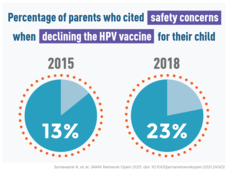| Cancer Information Highlights |
| From the National Cancer Institute |
| Updating you about cancer causes, prevention, screening, treatment, coping, and more |
| |
| New from NCI |
| From Scan to Scan: The Challenges of Living with Metastatic Cancer |
 | | New treatments are helping more people with advanced or metastatic cancer live longer. At a recent NCI conference, survivors and researchers came together to discuss how to better address the needs of those living with metastatic cancer. |
| More Parents Have Concerns about HPV Vaccines |
 | | Despite more than 15 years of data that show that HPV vaccines are safe and effective, a new study has found that, in recent years, more parents have concerns about the vaccines' safety. The findings highlight an urgent need to address these concerns with parents. |
Pembrolizumab May Help Prevent Early-Stage Melanoma from Returning
Research results show that people who received the immunotherapy pembrolizumab (Keytruda) after surgery to remove certain melanomas were less likely to have cancer come back than those who did not receive treatment after surgery. |
| The Tech Revolution in Cancer Research and Care |
 | | A number of advances in technology have led to breakthroughs in how we find, see, understand, and treat cancer. Read about two of these advances: CRISPR and artificial intelligence. |
| Computer-Based Drug Design: Advancing the Discovery of New Cancer Medicines |
 | | Computer technology could help researchers find matches between targets in the body that cause cancer and possible drugs. This section of the NCI Annual Plan & Budget Proposal for Fiscal Year 2023 describes how NCI is poised to make the most out of advances in computer technology to help find new drugs to treat and prevent cancer. |
Enhertu May Be Preferred Treatment for Some Breast Cancers
A recent clinical trial showed that a targeted therapy called trastuzumab deruxtecan (Enhertu) lengthened the time that people with an aggressive type of breast cancer lived without their cancer getting worse. Learn more about the therapy, which is made up of a monoclonal antibody linked to a chemotherapy drug, and the ongoing study.
|
| PDQ Updates |
Oral Cavity and Nasopharyngeal Cancers Screening
We've updated our summary on screening for oral cavity and nasopharyngeal cancers with a new title and revisions to all sections. |
No comments:
Post a Comment